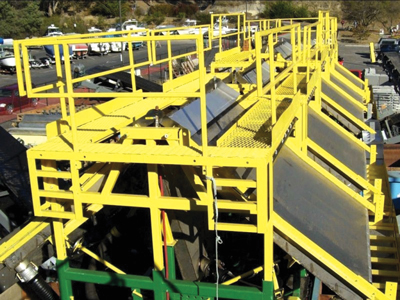 Veolia Water Solutions & Technologies South Africa will provide a containerized water treatment plant—built into six 40-ft (12.2-m) shipping containers—to the Kansanshi copper mine near Solwezi in Zambia. As part of a new copper smelter project, the mine aims to expand annual copper output from 340,000 tons in 2013 to 400,000 tons by 2015.
Veolia Water Solutions & Technologies South Africa will provide a containerized water treatment plant—built into six 40-ft (12.2-m) shipping containers—to the Kansanshi copper mine near Solwezi in Zambia. As part of a new copper smelter project, the mine aims to expand annual copper output from 340,000 tons in 2013 to 400,000 tons by 2015.
“As the world’s eighth largest copper mine, the new Kansanshi smelter has very specific requirements for boiler feed, process and drinking water,” said Nigel Bester, project engineer at Veolia’s Engineered Systems & Services division. “The result is a flagship water treatment solution that upgrades river water to match each requirement exactly, with guaranteed availability due to a duty standby design on all process streams.”
Veolia will completely manufacture, test and certify the six plants at its factory in Sebenza, Gauteng, before they are transported to the site. The containerized plants are designed to be linked up to one another on site, and will operate as a single plant with multiple output streams to produce a combined 42.5 m3 of treated water per hour.
“The plant has been designed to ensure maximum viability, so we have taken a high-end engineering approach to match each treatment stage’s water with the mine’s requirements. This means that boiler feed water, for instance, isn’t subjected to all the treatment steps necessary for drinking water, which is much more viable than treating all the feed water to high-quality drinking standards regardless of its application,” said Bester.
After clarification, iron removal and sand filtration, the drinking water train consists of activated carbon filtration, polishing and ultimately UV disinfection. The boiler feed water will be subjected to the same initial processes, but will be diverted for carbon filtration, double-pass reverse osmosis, passed through a polishing filter and continuous electro deionization after passing through the initial sand filtration skids. The softened water for use in the smelter’s processes will be diverted from the demineralization stream before the second pass reverse osmosis membranes.
Veolia also announced in January that it has partnered with Genesis Water, the pioneer of the Genesis Rapid Dewatering System (RDS). As the exclusive Genesis partner in the global mining market, Veolia will deploy the Genesis RDS to help mining companies improve tailings management, recycle water and reduce reliance on tailings ponds.
“The unique technology of the Genesis RDS complements Veolia’s current portfolio of mining water solutions and provides their clients with a turnkey answer for tailings management,” said Rob Krause, CEO of Genesis Water. “Our equipment provides mining operations with a tremendous capability to recover and recycle water, helping to clear out tailings ponds and increase their capacity, and ultimately, reducing reliance on ponds altogether.”
“The Genesis RDS will introduce a new, sustainable approach that will lower the cost of tailings management for our clients,” said Chris Howell, global market director, mining and primary metals, for Veolia. “Tailings management and water recovery are critical components of any mining operation, and the ability to reduce reliance on tailings ponds opens up new possibilities for mining operations worldwide.”
The patented technology of the Genesis RDS achieves a 1:1 ratio of dredging (inflow) to dewatering of sub-micron particulates at high throughputs. The system can be operated continuously with minimal energy and maintenance requirements, and offers the benefit of immediate clear water recovery and the production of stackable, transportable solids, which can be more efficiently handled or further processed for asset recovery such as gravel, sand and soil.
Veolia will introduce the Genesis RDS technology to the global mining industry through Veolia’s network of mining clientele. Through the agreement, Veolia will distribute and operate the Genesis equipment at mining operations worldwide.









